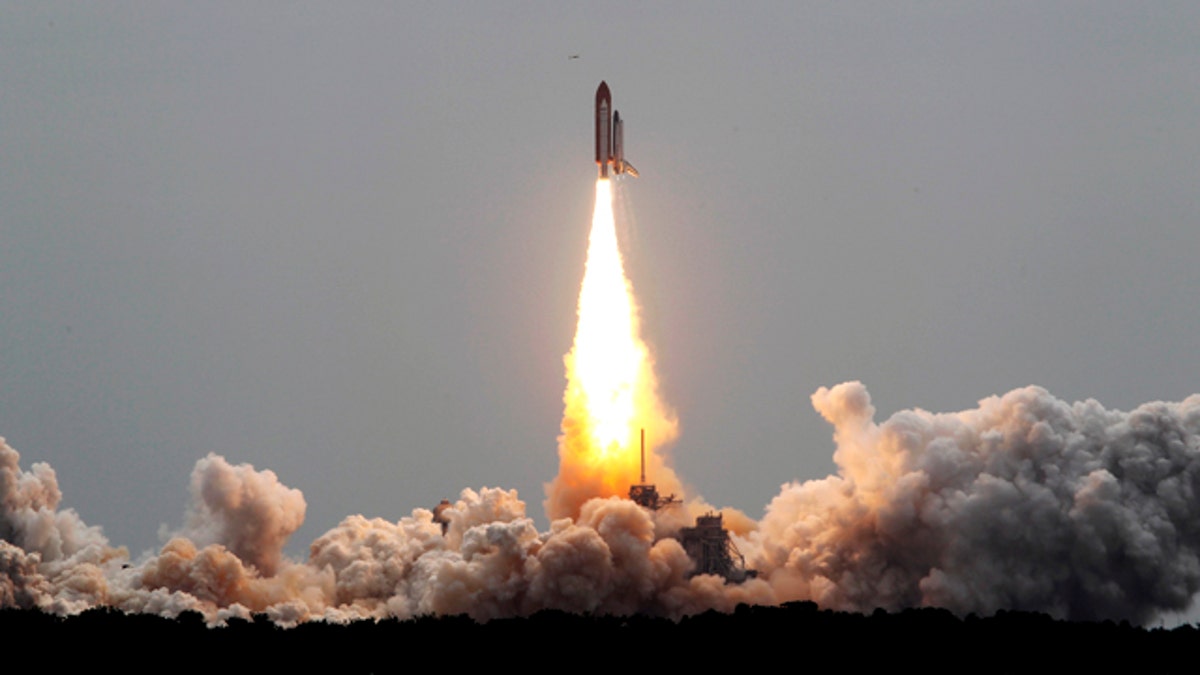
The space shuttle Atlantis lifts off from the Kennedy Space Center Friday, July 8, 2011, in Cape Canaveral, Fla. Atlantis is the 135th and final space shuttle launch for NASA. (AP Photo/Terry Renna)
Space shuttle Atlantis displayed its power and majesty one final time, rocketing into space from Kennedy Space Center at 11:26 a.m. ET Friday morning despite threatening weather -- marking the final launch after 30 years for NASA's storied fleet of shuttles.
Seven million pounds of thrust from the shuttle's rocket booster carried the vehicle into orbit one last time, at speeds of up to 19,000 miles per hour, for an expected meeting with the International Space Station on Sunday.
It was a bittersweet moment for everyone involved.
"The sense of history, the legacy of what has happened here over three decades, is palpable," a Mission Control spokesman said before the launch, noting that "30 years and three months ago, it was Columbia on the launch pad awaiting lift off."
"America will continue the dream," the launch director said as Atlantis lifted-off on its 33rd and last flight.
The crew -- Commander Chris Ferguson, Pilot Doug Hurley, Mission Specialist Sandy Magnus and Mission Specialist Rex Walheim -- had arrived at the launch pad's White Room at 8:06 a.m. ET for the boarding process, undeterred by reports that there was only a 30 percent chance of favorable weather for blast off.
"For the final time, good luck, godspeed, and have a little fun up there," launch director Mike Leinbach told the shuttle crew before lift off.
In a video message released after the launch, NASA chief Charles Bolden saluted the final flight of Atlantis -- and offered hope for the future of U.S. spaceflight.
"Over three decades, the shuttle has brought this nation many firsts, and many, many proud moments," Bolden said. "The shuttle pioneers have made the next chapter of human spaceflight possible."
"American ingenuity is alive and well, and it will fire up our economy -- and help us win the future," he added.
The gloomy weather predictions in the days leading up to the historic final flight did not deter crowds: At least 750,000 spectators were gathered at nearby vantage points early Friday, AFP reported, eager to catch a glimpse of the 30-year space shuttle program's swan song.
NASA had been predicting as many as 1,000,000 viewers for Atlantis' final blast off.
At Kennedy Space Center, staff were in a contemplative mood. Thousands are set to lose their jobs after the mission as NASA enters a period of reduced activity.
"It is a sad time," NASA astronaut Terry Virts said, reflecting on what he called the "passion" of many of his coworkers. "The sad part about it is that we won't have an American ability to launch astronauts anymore."
The highly-anticipated flight of Atlantis is the 135th and last for the U.S. space shuttle program, leaving Russia's space capsules as the sole option for astronauts heading to and from the International Space Station.
Newscore contributed to this story.








































